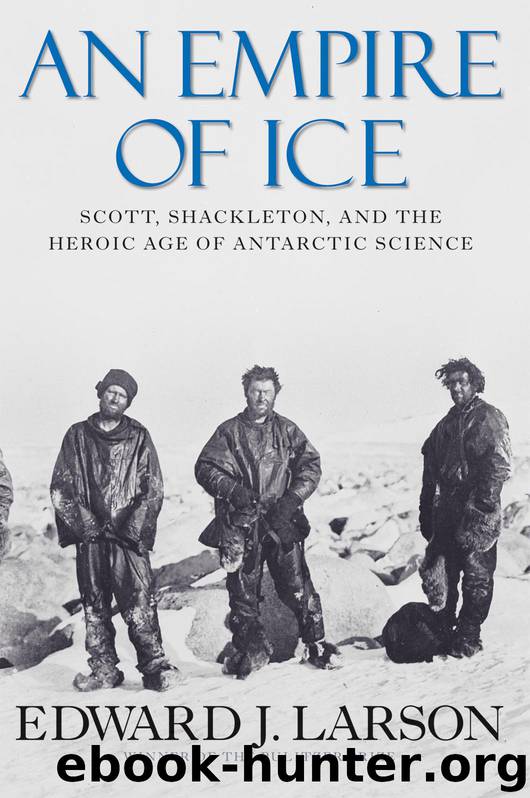An Empire of Ice by Edward J. Larson

Author:Edward J. Larson
Language: eng
Format: epub
Publisher: Yale University Press (Ignition)
Published: 2011-08-27T16:00:00+00:00
Route of the winter journey of Edward Wilson, Birdie Bowers, and Apsley Cherry-Garrard around Ross Island to Cape Crozier (1911), from Scott’s Last Expedition (New York, 1913).
CHAPTER 6
March to the Penguins
DISCOVERY SAILED FOR SCIENCE. ALL INVOLVED said as much. One of the expedition’s two sponsors was the Royal Society, the British Empire’s leading voice for basic research in science. In discussing government support for the venture, First Lord of the Treasury Arthur Balfour commented, “It would not be creditable to an age which flatters itself, above all other ages, to be a scientific age, if without reluctance we acquiesced in the total ignorance which now envelopes us of so enormous a portion of the southern hemisphere.” King Edward VII, in his sendoff speech from Discovery’s deck, told the explorers, “I have often visited ships in order to say farewell when departing on warlike service; but you are starting on a mission of peace, and for the advance of knowledge.”1
Some expedition proponents and participants clearly had motives that had little to do with science. Scott hoped for promotion and perhaps the pole; Markham dreamed about deeds of “derring doe”; the British public hungered for heroes; the RGS wanted to fill blank spaces on the world’s maps. None of these goals precluded science. In Edwardian England, doing good research in extreme conditions was a reason for promotion, a recognized species of adventure, and a significant part of what made the effort heroic. Without gathering facts and collecting specimens from nature along the way, the explorers simply could not fill the globe’s largest blank space to the RGS’s satisfaction. Recounting the results of the expedition’s first year while Discovery remained locked in the Antarctic ice, Markham tellingly exclaimed to RGS members, “Think of them now, entering cheerfully upon a second winter! Think of the terrible hardships and suffering they have gone through for science!”2
To gain the government, institutional, and public support needed to fund the expedition on the scale they wanted, Markham and other RGS leaders added various scientific justifications to what they originally envisioned as mainly a daring journey of geographical discovery. Promises of research in terrestrial magnetism, meteorology, oceanography (including marine biology), and later in geology and glaciology all found their way into the expedition’s official instructions. When it sailed, Discovery carried all manner of magnetic instruments, weather gauges, drift nets, and dredging equipment. Given the intense subsequent interest in Antarctic biology and the raging early-twentieth-century debates over evolutionary mechanisms, however, the initial discussion and directions for the expedition made surprisingly few references to the study of animals and plants on land. A prospectus of Discovery’s scientific program published in the science journal Nature explained, “The biological work of the expedition will be mainly at sea; for the ancient maxim that ‘Nature loves life’ does not appear to apply to the Antarctic lands. The main biological duty of the expedition is to make as extensive a collection of the fauna and flora of the Antarctic Ocean as the ship’s storage will admit.
Download
This site does not store any files on its server. We only index and link to content provided by other sites. Please contact the content providers to delete copyright contents if any and email us, we'll remove relevant links or contents immediately.
Man-made Catastrophes and Risk Information Concealment by Dmitry Chernov & Didier Sornette(6019)
The Revenge of Geography: What the Map Tells Us About Coming Conflicts and the Battle Against Fate by Kaplan Robert D(4077)
Zero Waste Home by Bea Johnson(3839)
COSMOS by Carl Sagan(3625)
Good by S. Walden(3558)
In a Sunburned Country by Bill Bryson(3542)
The Fate of Rome: Climate, Disease, and the End of an Empire (The Princeton History of the Ancient World) by Kyle Harper(3067)
A Wilder Time by William E. Glassley(2863)
Camino Island by John Grisham(2798)
Organic Mushroom Farming and Mycoremediation by Tradd Cotter(2692)
The Ogre by Doug Scott(2683)
Human Dynamics Research in Smart and Connected Communities by Shih-Lung Shaw & Daniel Sui(2501)
Energy Myths and Realities by Vaclav Smil(2493)
The Traveler's Gift by Andy Andrews(2461)
9781803241661-PYTHON FOR ARCGIS PRO by Unknown(2372)
Inside the Middle East by Avi Melamed(2357)
Birds of New Guinea by Pratt Thane K.; Beehler Bruce M.; Anderton John C(2255)
A History of Warfare by John Keegan(2244)
And the Band Played On by Randy Shilts(2209)
